- Home
- Alex Hughes
Vacant
Vacant Read online
PRAISE FOR THE NOVELS OF ALEX HUGHES
Marked
“Incisive writing, conflicted characters, and strong plotting, this . . . solidifies Hughes’s place on the urban fantasy shelves.”
—Publishers Weekly
Sharp
“If you like a futuristic murder-mystery-driven world, with a male protagonist that definitely has his share of woes and mystery, give this series a shot.”
—Smexy Books
“A mash-up of a noir detective series with supernatural elements . . . a wonderful genre blend of old-style detective stories and supernatural, with a flawed hero and a fascinating take on a world that outlaws technology.”
—All Things Urban Fantasy
“A grim and gritty police detective series, with a bit of science fiction mixed into an almost pulp-noir setting . . . a great series for both mystery lovers and those that enjoy a bit of sci-fi.”
—News and Sentinel (Parkersburg, WV)
“An emotional story fraught with danger.”
—Night Owl Reviews
“[Adam] is very well developed and written. Fans of Jim Butcher will enjoy this series.”
—USA Today
“The protagonist and premise are engaging. . . . The story keeps up its fast pace from beginning to end.”
—A Book Obsession
“A truly gritty and gripping novel . . . a fascinating world.”
—That’s What I’m Talking About
“A really solid detective story wrapped in some amazing dystopian urban fantasy paper. . . . Hughes does a fantastic job of creating a strong procedural plotline.”
—Team Tynga’s Reviews
“Fast paced and voyeuristically soul exposing . . . compelling.”
—Musings, Mutterings, and Acts of Mental Mayhem
Clean
“I am addicted to this world, this character, and this writer. Alex Hughes spins stories like wizards spin spells . . . a stellar debut!”
—James R. Tuck, author of the Deacon Chalk series
“A fun blend of Chinatown and Blade Runner.”
—James Knapp, author of Element Zero
“[A] tightly written futuristic detective story set in an alternate Atlanta. . . . This crisp debut marks Hughes as a writer to watch.”
—Publishers Weekly
“Really well-done.”
—USA Today
“I didn’t want to stop reading.”
—Smexy Books
“[A] fast-paced sci-fi yarn . . . reminds me very much (and very fondly) of Jim Butcher’s Dresden Files.”
—SF Signal
“An excellent start on a series . . . so many twists, turns, and double crossings. . . . I’m going to be first in line for the next novel in this Mindspace Investigations series.”
—Night Owl Reviews
“Fans will want more by Alex Hughes.”
—SFRevu
ALSO AVAILABLE BY ALEX HUGHES
The Mindspace Investigations Series
Clean
Sharp
Payoff (A Penguin Special Novella)
Marked
ROC
Published by the Penguin Group
Penguin Group (USA) LLC, 375 Hudson Street,
New York, New York 10014
USA | Canada | UK | Ireland | Australia | New Zealand | India | South Africa | China
penguin.com
A Penguin Random House Company
First published by Roc, an imprint of New American Library,
a division of Penguin Group (USA) LLC
Copyright © Alexandra Hughes, 2014
Penguin supports copyright. Copyright fuels creativity, encourages diverse voices, promotes free speech, and creates a vibrant culture. Thank you for buying an authorized edition of this book and for complying with copyright laws by not reproducing, scanning, or distributing any part of it in any form without permission. You are supporting writers and allowing Penguin to continue to publish books for every reader.
REGISTERED TRADEMARK—MARCA REGISTRADA
ISBN 978-0-698-13821-6
PUBLISHER’S NOTE
This is a work of fiction. Names, characters, places, and incidents either are the product of the author’s imagination or are used fictitiously, and any resemblance to actual persons, living or dead, business establishments, events, or locales is entirely coincidental.
Version_1
Contents
Praise
Also available by ALEX HUGHES
Title page
Copyright page
Dedication
CHAPTER 1
CHAPTER 2
CHAPTER 3
CHAPTER 4
CHAPTER 5
CHAPTER 6
CHAPTER 7
CHAPTER 8
CHAPTER 9
CHAPTER 10
CHAPTER 11
CHAPTER 12
CHAPTER 13
CHAPTER 14
CHAPTER 15
CHAPTER 16
CHAPTER 17
CHAPTER 18
CHAPTER 19
CHAPTER 20
CHAPTER 21
CHAPTER 22
CHAPTER 23
CHAPTER 24
CHAPTER 25
About the Author
To Ann, Tanith, Karen, the Even Odders, and Jeane,
to Kerry, Amanda, James, and Danielle,
to Jesse and Rebecca,
and all the rest who’ve helped me make
the series what it is.
Thank you.
And to the Millards
for being extraordinary on no notice.
CHAPTER 1
A sea of thoughts crashed into me like a tsunami, chaos given form with impossible force. I focused on the back of Isabella’s sweatshirt as I followed her through the crowds, past the food on the outside rim of Phillips Arena.
She finally moved into one of the alcoves with the big sign—a something and a number. My eyes were in slits, focused only on her to block out all those damn minds. She stopped against the concrete wall, pulling me out of the way. The crowd pushed against my shoulder periodically anyway, bursts of particular minds striking mine as their bodies ran into my shoulder.
She said something.
“What?”
“This was a terrible idea,” Isabella said, in the tone of someone repeating herself. “You’re not—”
“It’s fine,” I said, through gritted teeth. “You paid all the money for the tickets. You begged me to come. We’re here. Let’s see the show.”
“But—” Isabella waffled. Isabella Cherabino was a senior homicide detective for the DeKalb County Police Department, and as such was normally decisive. She must have had strong emotions about this concert, which I’d know if I wasn’t spending every spare bit of my energy shielding against the crush of minds all around me. There were times when telepathy was more of a curse than a blessing.
“It’s okay,” I said. It wasn’t, of course, but I was here, damn it. Might as well get through this.
She pulled me farther down the hall and waved our tickets again at new people, who pointed her down a set of stairs. I followed behind her, entire vision focused on the back of her shirt.
The ancient twice-remodeled stadium hosted hockey games, so it wasn’t exactly gorgeous, and the floating screens overhead looked like they’d fall down at any time. The whole place smelled like fried food and beer—old beer—but that wasn’t the worst part. The worst part was the people.
Maybe a hundred thousand people were jostling and yelling and talking and thinking around me, loudly. Their mental waves in Mindspace—groups upon groups of thin, normal mind-waves—added up to an ocean of force that overwhelmed all of my senses.
She found our seats and pushed me into mine. I gripped the ancient wooden armrests with shaking hands.
I had no idea how she’d talked me into this. Telepaths did not like crowds. I hadn’t had to deal with this level of overwhelming mental force since my final testing, more than twenty years ago now, and I strained under the pressure like a piano suspended over a cartoon character’s head. I swallowed, forcing myself against it.
My old teacher’s voice in my head reminded me that strength didn’t always get the job done, no matter how manly it felt at the time. Sometimes you had to be the duck, swimming with the current while the rain slipped off your back. I tried that, focusing on moving through the pressure cleanly rather than blocking it. A surfer on the edge of the sea, pushed along but not fighting. It helped, but only some.
Then Isabella reached over and took my hand, and warm feelings leavened with a little guilt rolled up my arm.
“Thank you for coming, Adam,” she said quietly. With the physical connection, I could feel her even through my shielding.
And I looked over and remembered why I’d come. I was with her.
Isabella was a beautiful woman with strong Italian features, thick, slightly curly hair she usually wore up, and a curvy body well worth a second look. She was in her late thirties, had a black belt in something Asian and deadly, and was one of the smartest people I knew. Her sense of justice in working with the police had been one of the things that had kept me on the wagon these last four years. Her strength of character and huge work ethic had been an inspiration for far longer.
It was impossible for me to believe that she was willing to date me; I’d been in love with her for years, and even though I couldn’t say it out loud yet, and even though we hadn’t had sex—she hadn’t been willing to make the nearly permanent commitment that sex with a telepath implied—we were dating. Four months and change now. And she’d been falling asleep in my arms nearly as long. She’d even filled out the official relationship form with the department, calling me boyfriend in plain text where anyone could read it. It was a miracle, as far as I was concerned.
So if I had to stand in the middle of the worst press of minds in my life, I would. I’d do nearly anything for her.
After ten minutes or so, the lights dimmed and the crowd roared. The minds roared too, pressing against my consciousness like a hand squeezing a tube of toothpaste with the lid still on. Like that lid, I felt under pressure, impossibly strained. I wondered whether I’d really be able to survive this.
The screens came on, and the image of the aging rock musician Cherabino liked came on in a still photograph. Then the image fractured to be replaced by the concert logo. The crowd roared, and Mindspace trembled with pressure and interacting minds. Only two hours until it was over. She’d spent a fortune on the tickets, I told myself.
A manufactured smell—of volcanic gas, engine oil, and ozone—flooded the stadium, and the roaring of the crowd grew louder. Then the lights dimmed, and green spotlights flooded the empty stage floor in front of us. The smell of deep woods added to the mix in the air, growing things and moss and sunlight cutting through the darker smells of civilization. The smell came back to me from the minds around me, lessening the pressure with pure sensation.
A trapdoor opened in the middle of the stage, and a figure was slowly raised into the green light. The rocker’s peaked hair caught the light with glitter and phantom holograms, and the clothes were not much better, tight-fitting to a fault, glittering. She slung her spiky guitar in front of her body and strummed.
The noise filled the stadium and every mind in it, shaking our seats with pure sound. Isabella next to me was transfixed, her focus coming through our psychic Link.
The minds around me echoed the sound of the opening bars of the song, echoed the lights now turning red as the rocker screamed about dropping bombs, about bursting minds in the sixty-years-ago Tech Wars. And as she quieted and sang intense notes about a child growing up in a shattered city, every mind in the place cried with her.
I dropped my shields, dropped them entirely, and pulled my hand away from Isabella.
“What?” she said.
“Shh,” I said. The band was rising up at the back of the stage on more platforms from the floor, the lights ramping up, but I didn’t care. I closed my eyes.
The music swelled in screams again, drums coming in, and the beat fell into the minds of the crowd. The vision of what was happening onstage came through a thousand minds, an overlapping kaleidoscope vision of one idea, one experience, one moment. And it continued. It continued.
No one was here who didn’t love this band. No one paid who didn’t live for this moment. And here, in the middle of all of it, I felt like a feather flying in the wind, a glider sailing on the sea of emotional high. The music swelled again, and my heart with it. Sound and vision and fury and a thousand happy minds crashed into me, and I breathed them in.
Sometime later, the world dissipated into a sea of clapping, and I came back to myself. I built shields, slowly, to block out the Mindspace now fracturing into chaos. The pressure, the unpleasantness returned, and I returned to laboring against it, but left in my mind was that one, pure note, the note that had started it all.
Isabella poked me.
“What?” I said, reluctantly opening my eyes.
“I said, did you like it?”
“That was . . . that was great,” I said. It was the understatement of the century.
“Are you okay?” she asked. Then she wondered if she needed to call Swartz, my Narcotics Anonymous sponsor. “You look . . . high.”
“Just the concert,” I said. I stood then; someone pushed by on their way to the aisle. “Can we hang around until most of the people are gone?” I asked. I’d rather not deal with all those minds wanting so desperately to get out of here; I was already feeling the edge of that flight response and didn’t want it intensified.
“Sure,” she said, but she looked at me suspiciously.
As another couple moved out of the row, squeezing in front of us, I realized I had to make an effort at conversation now. I really wanted to sit down and process what I’d just experienced—something I’d never, in my forty years, even dreamed of—but this was Isabella.
“What did you think of the ballad about the miniature giraffe?” I asked her.
“That was hilarious,” she said, still looking suspicious. But she sat down, and I sat down, and as people moved out of the old stadium like ants and strange smells moved through the concert system in front of us, we talked.
After a while she was even smiling.
I’d done well tonight, I thought to myself. But at the back of my brain, I wondered. Did I really need something else in my life that was that . . . addictive?
* * *
We waited over an hour, until the majority of the minds were long gone. When we walked out of the arena building, it was dark, and the street was nearly deserted, just a few clusters of people here and there. Our breath fogged in the late-February air, the winter on its last greedy weeks of cold. Bioengineered trees with luminescent glowing orbs illuminated the sidewalk in dim blue light, which stretched farther than you thought it should, beautiful and simple, feeling artificial and natural all at once. They held up well to the cold, I noticed, as I huddled in my jacket a little deeper.
A small group of guys stood about a hundred feet away, their body language tense and confrontational. Cherabino’s hand moved toward the gun on her waist she wasn’t carrying.
Then one guy yelled, and the group turned inward. The dull slap of repeated fist blows hit the air.
Cherabino considered whether to get involved.
> I turned—but it was too late. A man stood there, at least fifty-five and thin. He was short, balding, with dark skin that caught up blue highlights from the bioluminescent streetlight. In Mindspace, his presence had wiry strength and desperation mixed. He held a pole as tall as himself, maybe fifty T-shirts hooked into loops on the pole, shirts with a cheaply copied logo of the band we’d just seen.
“Buy a shirt. Just ten ROCs,” he said, but his tone was angry.
“No, thanks,” I said.
“Keep moving, sir,” Cherabino said, a little of her cop voice leaking into her speech, moving toward a defensive stance.
Another guy came up, behind us, one of the ones from the group who’d been fighting. The others held back, working out their aggression, close to leaving. I moved around to look at him.
“Buy a shirt or my buddy and I have something to say.”
“No way those are official shirts,” I said. “You’re stealing from the artist.”
I felt the first guy’s decision, but Cherabino was already moving.
Pain from behind me. Cherabino in judo mode.
The buddy charged me. I went to get a grip on his mind—and failed.
He punched me in the jaw. I saw stars, and my legs went out from underneath me.
I blinked up, trying to get my bearings, but he kicked me. I whimpered. Not the most manly moment, but it hurt, damn it. I pushed back up.
Cherabino was over me then, badge out in the guy’s face. “Police,” she said.
She went flying and somebody kicked me back down again. I put my hands over my head to protect it and tried to get a grip on the guy’s mind one more time. Slippery fellow—we had bad valence, terrible valence, and I couldn’t get a grip.
I went for the first one—and him I could grip. I hit the center of his mind, knocking him out. He slumped down, landing on top of the abandoned T-shirt rack.
I got up to my knees just in time to watch Cherabino punch the buddy in the face. “Police,” she said, standing over him. “Don’t ever let me see you around here again.”
“Shouldn’t you arrest them?” I asked.

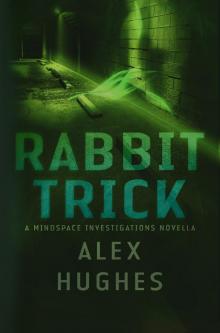 Rabbit Trick: A Mindspace Investigations Short Story
Rabbit Trick: A Mindspace Investigations Short Story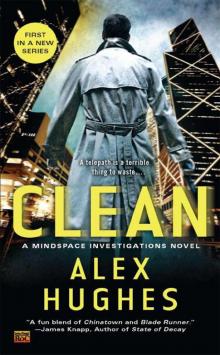 Clean: A Mindspace Investigations Novel
Clean: A Mindspace Investigations Novel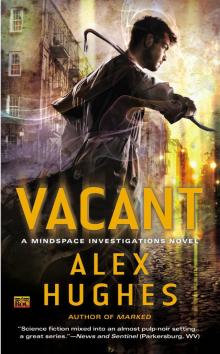 Vacant
Vacant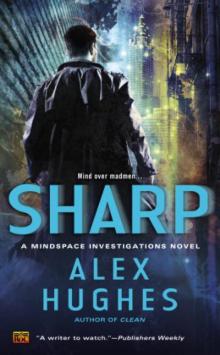 Sharp: A Mindspace Investigations Novel
Sharp: A Mindspace Investigations Novel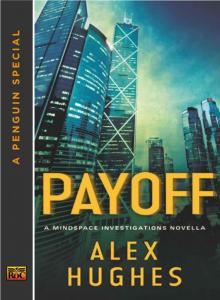 Payoff
Payoff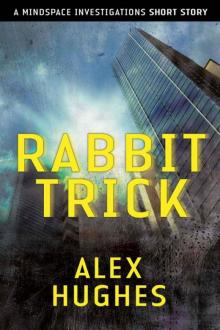 Rabbit Trick: A Mindspace Investigations Novella
Rabbit Trick: A Mindspace Investigations Novella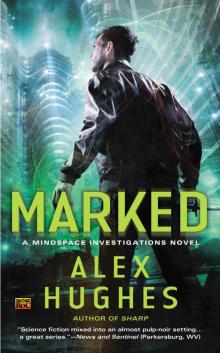 Marked
Marked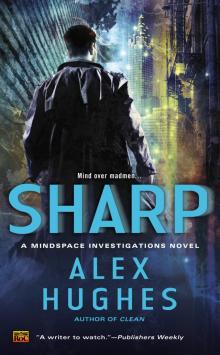 Sharp
Sharp